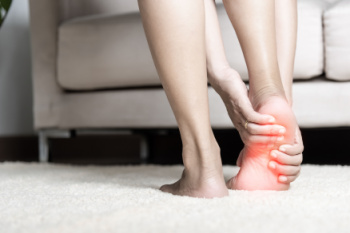Symptoms of Plantar Fasciitis
Tuesday, 27 August 2024 00:00
Plantar fasciitis causes distinct symptoms centered on the sole of the foot, particularly near the heel and arch. Individuals often experience sharp pain or discomfort along the bottom of the foot, radiating from the heel toward the toes. The pain tends to be most intense during the initial steps after waking up or following prolonged periods of rest, known as post-static dyskinesia. Throughout the day, the pain may lessen with movement but can intensify after long periods of standing or walking. Some describe the pain from plantar fasciitis as a dull ache or burning sensation. The arch of the foot may also feel tender to the touch, especially near the heel where the plantar fascia attaches to the bone. If you are experiencing heel pain, it is strongly suggested that you make an appointment with a podiatrist sooner rather than later. This foot doctor can accurately diagnose plantar fasciitis and begin an effective relief and treatment plan.
Plantar fasciitis is a common foot condition that is often caused by a strain injury. If you are experiencing heel pain or symptoms of plantar fasciitis, contact Dr. Kirk Sherris from Liberty Bay Foot & Ankle. Our doctor can provide the care you need to keep you pain-free and on your feet.
What Is Plantar Fasciitis?
Plantar fasciitis is one of the most common causes of heel pain. The plantar fascia is a ligament that connects your heel to the front of your foot. When this ligament becomes inflamed, plantar fasciitis is the result. If you have plantar fasciitis you will have a stabbing pain that usually occurs with your first steps in the morning. As the day progresses and you walk around more, this pain will start to disappear, but it will return after long periods of standing or sitting.
What Causes Plantar Fasciitis?
- Excessive running
- Having high arches in your feet
- Other foot issues such as flat feet
- Pregnancy (due to the sudden weight gain)
- Being on your feet very often
There are some risk factors that may make you more likely to develop plantar fasciitis compared to others. The condition most commonly affects adults between the ages of 40 and 60. It also tends to affect people who are obese because the extra pounds result in extra stress being placed on the plantar fascia.
Prevention
- Take good care of your feet – Wear shoes that have good arch support and heel cushioning.
- Maintain a healthy weight
- If you are a runner, alternate running with other sports that won’t cause heel pain
There are a variety of treatment options available for plantar fasciitis along with the pain that accompanies it. Additionally, physical therapy is a very important component in the treatment process. It is important that you meet with your podiatrist to determine which treatment option is best for you.
If you have any questions, please feel free to contact our office located in Poulsbo, WA . We offer the newest diagnostic and treatment technologies for all your foot care needs.







